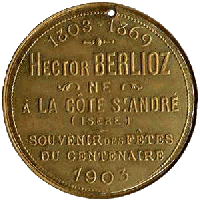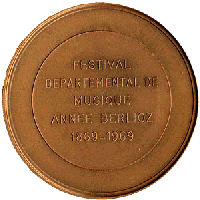
Berlioz Anniversaries

 |
Berlioz Anniversaries
|
 |
This page is also available in French
![]()
‘My musical career might end up being delightful, if I could live only 140 years’, wrote Berlioz in 1864 in the Postface of his Memoirs. Compared to many other great composers, Berlioz was slow to achieve general recognition; in the event it took over a century after his death before he could be said to have finally arrived. Important landmarks in his growing recognition were the anniversaries of his birth (11 December 1803) and of his death (8 March 1869), that is the centenaries of 1903 and 1969, and the bicentenary of 2003. Not only did they generate numerous commemorative events – concerts, symbolic gestures, speeches, conferences – but they helped to spread knowledge of his work and appreciation of his achievement, through the publication of articles and books about him, and especially the publication of his own works, whether music or writings. Numerous pages on this site deal directly or indirectly with these anniversaries; the purpose of this page is to bring together in one place the links to these different entries.
![]()
The 1903 celebrations were accompanied by numerous publications, a number of which are reproduced on this site (see the listing below, and the bibliography by Michael Wright). But they also provided the stimulus for the launching of the first attempt at a complete edition of the composer’s music by the Leipzig publishing firm of Breitkopf and Härtel. In the event the edition was incomplete (it lacked notably the operas Benvenuto Cellini and Les Troyens) and had its shortcomings, but it was nevertheless an important step forward.
Interest in the music of Berlioz was alive in Germany at the time, dating back to the composer’s numerous concert tours of the country through much of his career, from 1842 to 1867; it continued after his death, so it was perhaps not surprising that the attempt at a complete edition of his music should have originated in Germany and not in France. But the German publishers were taking advantage of the difference in copyright laws between Germany and France: in Germany copyright expired 30 years after the composer’s death, i.e. in 1899, whereas in France it was 50 years. This meant that a new edition of Berlioz’s music, which had initially all been published in France (as well as elsewhere in Europe), could not be considered in France until 1919. One might remark here that 1919, the 50th anniversary of the composer’s death, could conceivably have been an important milestone but for the fact that it came immediately after the First World War. Europe was just beginning to recover from the destruction caused by the war, and the time was clearly not ripe for elaborate celebrations (note the article by Adolphe Jullien published on the occasion of that anniversary).
![]()
As may be seen from the list below, there are fewer articles on this website for the 1969 celebrations than for those of 1903. One reason for this is the question of copyright: whereas articles published around 1903 are no longer subject to copyright, the same is not true for 1969, and only in a few cases was it possible to obtain permission to reproduce them. The impression given is therefore misleading: in reality the 1969 centenary was decisive in promoting knowledge of Berlioz’s work, in that it was then that a series of major publishing projects were formulated: new annotated editions of the composer’s four books (Les Soirées de l’orchestre, Les Grotesques de la musique, À Travers chants and his Mémoires); a complete edition of his correspondence (Correspondance générale), and also of his collected critical writings (Critique musicale), and last not but least a new edition of his music (the New Berlioz Edition), to be published by Bärenreiter and under the general editorship of Hugh Macdonald, which was intended not just to complete but supersede the old Breitkopf and Härtel edition. All these projects were actively pursued over the coming years and looked forward to the bicentenary of 2003.
There were other significant landmarks in 1969 or occasioned by it, notably the construction of a new tomb of the composer at Montmartre cemetery, the first complete recording of Les Troyens (conducted by Colin Davis and based on the production at Covent Garden), a performance of the Symphonie funèbre et triomphale and of the Te Deum at St Paul’s cathedral in London (also conducted by Colin Davis), and the publication of the first edition of David Cairn’s annotated translation of Berlioz’s Memoirs.
![]()
Compared to 1903 and 1969 the bicentenary of 2003 witnessed the largest number of celebrations worldwide and received the greatest publicity, but as far as promoting knowledge and appreciation of Berlioz’s works it was building on the foundations laid by the 1969 centenary and all the work that had been taking place since then. Unlike for the previous centenaries we were able to document the celebrations as they took place and collect the information in a single place: see the references below.
![]()
By the time it came to the 150th anniversary of the composer’s death (8 March 2019), most of the groundwork on the major editions of Berlioz’s musical and literary output had been completed or was nearing completion. The New Berlioz Edition of his musical works was finished in 2006, volume VIII of Correspondance générale appeared in 2003 and a further volume of letters (Nouvelles Lettres de Berlioz, de sa famille, de ses contemporains) came out in 2016, and the last volume of Critique musicale was published in 2020. Nevertheless 2019 was extensively celebrated: see the page Berlioz 150. Celebrations of the 150th anniversary of his death, with detailed listing under 4 headings: Memorabilia, Concerts, Conferences and seminars, and Broadcasts and other events.
![]()
Future anniversaries that may be expected to be significant and receive commemoration are 2053 (the 250th anniversary of the composer’s birth), 2069 (the bicentenary of his death), and 2103 (the tercentenary of his birth), but it is not clear how much they will add to what has already been achieved. Nor is it clear how many of us can realistically expect to witness any of these future events, at least as far as the present century is concerned, nor even how many will actually take place. This depends on the future of the planet and the course of human civilisation in coming decades, neither of which can at the moment be taken for granted.
![]()
The Hector Berlioz Website was created by Monir Tayeb and Michel Austin on 18 July 1997;
The page Berlioz Anniversaries was created on 1 April 2023.
© Monir Tayeb and Michel Austin